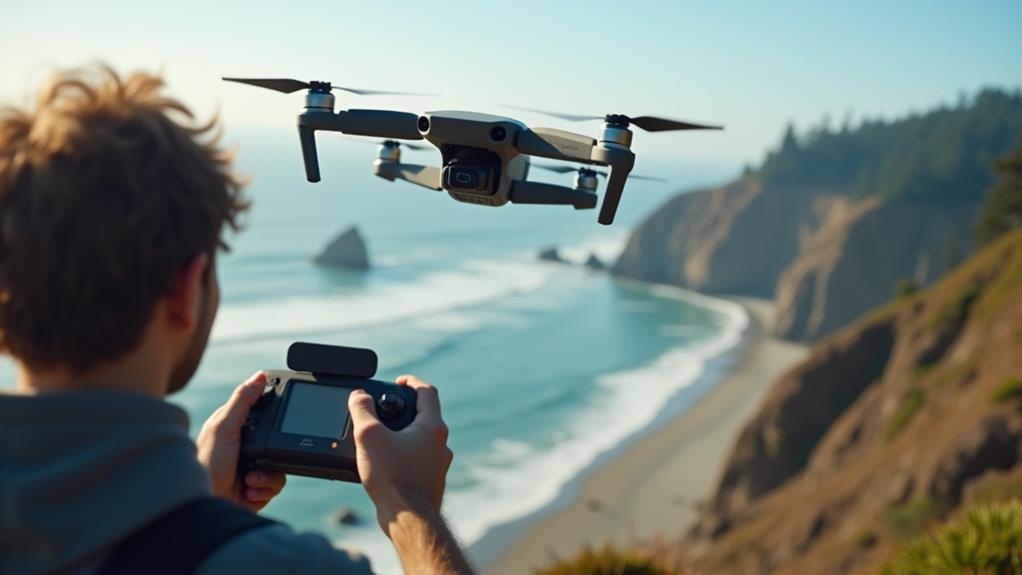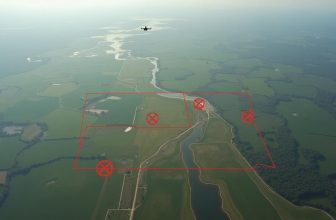
You're about to take to the skies with your drone in Oregon, but let's just say there are a few "guidelines" you should be aware of first. As you prepare for liftoff, it's essential to know that Oregon has specific laws in place to ensure safe and responsible drone operations. For instance, registration is required for drones over 0.55 pounds, and recreational operators must meet certain age and safety requirements. But that's just the tip of the iceberg – what about restricted airspace, commercial operation laws, and the consequences of non-compliance? The rules can get complex, and it's crucial you understand them before taking flight.
Contents
Key Takeaways
- In Oregon, drones over 0.55 pounds must be registered with the FAA, with a unique registration number displayed on the drone.
- Recreational drone operators must be at least 13 years old and comply with Drone Safety Tips, such as maintaining a visual line of sight.
- Commercial drone operators require a remote pilot certificate with a sUAS rating from the FAA and must register their drones.
- National parks and military bases in Oregon are restricted airspace, and drone operations are prohibited without prior permission.
- Non-compliance with Oregon drone laws can result in fines, penalties, and revocation of drone operating privileges.
Recreational Drone Use Rules
In Oregon, you'll need to follow specific guidelines when operating a drone for recreational purposes.
According to the Federal Aviation Administration (FAA), you must register your drone if it weighs more than 0.55 pounds and less than 55 pounds. You'll also need to label your drone with your registration number and follow Drone Safety Tips, such as maintaining a visual line of sight and not flying near airports or in national parks.
As a recreational drone operator in Oregon, you'll need to comply with Residency Rules, which require you to be at least 13 years old to operate a drone.
You'll also need to pass an online safety test or complete a drone safety course to demonstrate your understanding of drone safety guidelines.
When flying your drone, you'll need to follow specific airspace restrictions and right-of-way rules.
You'll also need to respect private property and not fly over people or in areas with sensitive wildlife.
By following these guidelines, you can help ensure safe and enjoyable drone operation in Oregon.
Remember to stay informed about changing regulations and always follow best practices when operating your drone.
Commercial Drone Operation Laws
Operating a drone for commercial purposes in Oregon requires adherence to stricter regulations than recreational use.
As a commercial drone operator, you must hold a remote pilot certificate with a small unmanned aircraft systems (sUAS) rating from the Federal Aviation Administration (FAA). You'll also need to register your drone with the FAA and label it with its registration number.
Additionally, you may need to obtain business licensing and permits from the state of Oregon or local authorities.
You should check with the Oregon Secretary of State's office and your local government to determine the specific requirements for your business.
Drone insurance is also highly recommended for commercial operators.
While not mandatory, it can provide financial protection in case of accidents or damage to people or property.
You should consider purchasing liability insurance that covers damages or injuries caused by your drone.
You must also comply with all applicable federal, state, and local regulations, including those related to airspace, right-of-way, and privacy.
Failure to comply with these regulations can result in fines, penalties, or even the revocation of your remote pilot certificate.
Drone Registration Requirements
You've obtained your remote pilot certificate and are ready to take to the skies for commercial purposes.
As a drone owner, you must comply with Federal regulations regarding drone registration. The Federal Aviation Administration (FAA) requires all drones weighing more than 0.55 pounds and less than 55 pounds to be registered.
This applies to both recreational and commercial drone owners. You'll need to register your drone on the FAA's online registration system, providing basic information about yourself and your drone.
Once registered, you'll receive a unique registration number that must be displayed on your drone. This number serves as proof of registration and helps authorities identify your drone in case of an incident.
Failure to register your drone can result in fines and penalties, so it's essential to comply with these regulations. Drone owners must also ensure their drones are properly labeled and that they carry proof of registration during flight operations.
Restricted Airspace in Oregon
Restricted Airspace in Oregon
When flying a drone in Oregon, you'll often need to navigate through various types of airspace, some of which are restricted.
It's essential to familiarize yourself with these restricted areas to avoid any potential issues or penalties.
National parks in Oregon, such as Crater Lake National Park, are considered restricted airspace.
The Federal Aviation Administration (FAA) prohibits drone operations within these areas unless you have obtained prior permission from the park's administration.
Additionally, some national forests and wilderness areas may also have restrictions in place.
Military bases, including those operated by the US military and the Oregon National Guard, are also restricted airspace.
These areas are typically marked on aeronautical charts and online mapping platforms.
You should also be aware of temporary flight restrictions (TFRs) that may be in place due to various events or activities.
Before flying your drone, always check the FAA's B4UFLY app or other online resources to ensure you're aware of any restricted airspace in your intended flight area.
Failure to comply with these restrictions can result in fines and penalties.
Make sure to plan your flights carefully to avoid any potential issues.
Drone Pilot Certification Process
If you're looking to operate a drone in Oregon, you'll need to understand the drone pilot certification process.
You'll need to determine which type of certification is required for your specific operation, and whether you meet the eligibility requirements.
To get certified, you'll need to follow the application process, which involves submitting an application and passing a knowledge test administered by the Federal Aviation Administration (FAA).
Types of Certifications
Obtaining the right certification is crucial in Oregon for operating a drone safely and lawfully.
As a drone pilot, you have several types of certifications to choose from, each with its own specific requirements and benefits.
The Federal Aviation Administration (FAA) offers the Part 107 certification, which is required for commercial drone operations.
This certification involves passing a knowledge test and meeting certain age and background requirements.
If you're interested in teaching others to fly drones, you'll need to obtain drone instructor qualifications, which typically involve having a Part 107 certification and completing a training program approved by the FAA.
Additionally, you may also want to consider specialized certifications, such as aerial cinematography certifications.
These certifications demonstrate your expertise in specific areas of drone operation and can be beneficial for securing jobs or contracts.
Some organizations, such as the Association for Unmanned Vehicle Systems International (AUVSI) and the Drone Pilots Federation, offer certifications in aerial cinematography and other specialized areas.
Eligibility Requirements
You've identified the type of drone pilot certification you need in Oregon, but now it's time to consider the eligibility requirements for the certification process.
The Federal Aviation Administration (FAA) sets the eligibility requirements for drone pilot certification, which apply to Oregon as well.
To be eligible for a drone pilot certification in Oregon, you must be at least 16 years old.
This age restriction applies to all types of drone pilot certifications, including the Part 107 remote pilot certification. If you're under 18 years old, you must have a parent or guardian's consent to apply for the certification.
In addition to age restrictions, you must also meet certain medical requirements.
You must be able to read, speak, write, and understand English.
You must also be in a physical and mental condition to operate a drone safely.
However, you don't need a medical certificate from a doctor, unless you're applying for a Part 61 pilot certificate.
It's essential to review the FAA's eligibility requirements carefully to ensure you meet all the conditions before proceeding with the certification process.
Application Process
The Federal Aviation Administration (FAA) outlines a step-by-step application process for drone pilot certification in Oregon, which involves several key steps to ensure compliance with federal regulations.
You'll need to create an account on the FAA's Integrated Airman Certification and Rating Application (IACRA) system and complete the online application for a remote pilot certificate with a small unmanned aircraft systems (sUAS) rating.
You'll need to pass a background check by the Transportation Security Administration (TSA) and obtain a drone permit before flying your drone in certain areas.
Additionally, you'll need to pass a knowledge test on aeronautical knowledge, weather, aircraft performance, and other topics related to drone operations.
To avoid application hurdles, ensure you meet the eligibility requirements and submit all required documentation, including proof of identity and citizenship.
You'll also need to pay the required fee for the knowledge test and drone permit.
Once you've completed the application process, you'll receive a remote pilot certificate with a sUAS rating, which is valid for two years.
It's essential to follow the FAA's guidelines and regulations to ensure a smooth application process and avoid any potential issues.
Penalties for Non-Compliance
Failing to comply with Oregon's drone laws can result in severe penalties.
If you're found to be operating a drone in a reckless or irresponsible manner, you may face serious consequences, including financial and legal repercussions.
Penalties for Non-Compliance
The state of Oregon takes drone regulations seriously, and non-compliance can lead to:
- Fines Imposed: You may be required to pay a fine for violating drone regulations, which can range from a few hundred to several thousand dollars, depending on the severity of the infraction.
- Criminal Charges: In some cases, you may face criminal charges, such as reckless endangerment or disorderly conduct, which can result in imprisonment or community service.
- Revocation of Privileges: Your drone operating privileges may be revoked or suspended, prohibiting you from flying a drone in Oregon for a specified period.
It's essential to understand and adhere to Oregon's drone laws to avoid these penalties.
Frequently Asked Questions
Can I Fly a Drone in Oregon State Parks?
When flying a drone, you must check park rules and flight restrictions before launching in Oregon state parks. You'll need permission from park authorities and should be aware of designated no-fly zones and restricted airspace.
Are Drone Insurance Policies Available in Oregon?
You can find drone insurance policies, with 77% of drone owners opting for coverage. When shopping for drone insurance in Oregon, look for policies offering drone coverage and liability waivers to protect your assets.
How Do I Report a Rogue Drone in Oregon?
You can report a rogue drone by contacting the FAA's drone reporting system, detailing instances of drone harassment or airborne threats, then filing an incident report with the Oregon State Police or local authorities accordingly.
Can I Use a Drone for Search and Rescue Missions?
You can leverage drones for search and rescue missions, coincidentally aligning with global trends in Emergency Response. As you integrate aerial support, you'll enhance situational awareness, locate missing persons, and expedite response times in critical situations.
What's the Process for Drone Accident Reporting in Oregon?
When involved in a drone accident, you'll follow established Drone Safety protocols, report the incident to the FAA within 10 days, and document the Accident Protocol, including details of the incident and any injuries or damage sustained.
Conclusion
Carefully complying with Oregon drone laws is crucial for cautious citizens. Familiarize yourself with regulations to flawlessly fly your drone. From recreational rules to commercial operations, registration requirements, and restricted airspace, understanding the laws will help you responsibly navigate Oregon's skies. By following these rules, you'll ensure safe and successful flights, avoiding fines and penalties. Precise piloting practices and proper protocol will be your passport to problem-free drone use.






